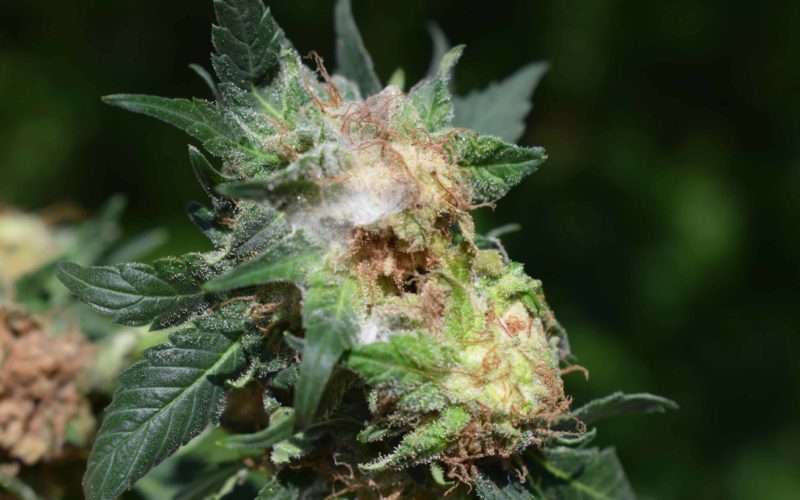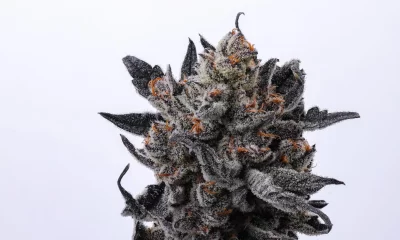Business
Colorado Regulators Issue Recall for Moldy Weed

Colorado identified “potentially unsafe levels of total yeast and mold and aspergillus” in a strain of flower.
A pair of Colorado agencies last week issued “a Health and Safety Advisory” after identifying “potentially unsafe levels of total yeast and mold and aspergillus on Medical Marijuana flower (bud/shake/trim)” that was produced by a business based in Colorado Springs.
The advisory was issued by both the Colorado Department of Revenue (DOR) and the Colorado Department of Public Health and Environment, which said that the tainted bud came from a producer known as The Living Rose, a medical cannabis retailer in Colorado Springs.
The two agencies “deem it a threat to public health and safety when marijuana is found to have levels of total yeast and mold and aspergillus above the acceptable limits established” by Colorado cannabis regulations.
“[The Department of Revenue] has identified Harvest Batches of Medical Marijuana produced by [The Living Rose] that were not submitted for testing…Harvest Batches of Medical Marijuana produced by [The Living Rose] were required to be tested by the [Department of Revenue] and were found to contain total yeast and mold and aspergillus above the acceptable amounts,” read the advisory, which was issued last Wednesday.
The advisory said that consumers “who have affected marijuana items in their possession should destroy them or return them to the Medical Marijuana Store from which they were purchased for proper disposal,” and that consumers “who experience adverse health effects from consuming the marijuana should seek medical attention immediately and report the event to the Marijuana Enforcement Division by submitting a MED Reporting Form.”
“All affected marijuana has a label affixed to its container that, at a minimum, indicates the license number of the Medical Marijuana Business that cultivated the marijuana as well as the Harvest Batch number assigned to the marijuana,” the advisory said.
Colorado Springs, the second largest city in the state behind Denver, has more than 100 medical marijuana dispensaries, but it does not permit recreational cannabis sales in its jurisdiction. Next week, however, voters there will decide on two separate ballot measures that could change that and allow adult-use weed sales in the city.
One ballot measure would legalize recreational pot sales in Colorado Springs, while the other would levy a five percent sales tax on adult-use transactions.
“Voters in the city stepped up and demanded their voice be heard with respect to ending the prohibition of recreational cannabis sales in Colorado Springs,” said Anthony Carlson, the campaign manager for the group pushing to legalize sales in the city. “Especially in these tough economic times, it is critical to ensure every tax dollar that rightfully belongs to Colorado Springs taxpayers stays in our community working to improve our quality of life.”
Colorado voters legalized recreational pot sales back in 2012, but the law allowed local governments to opt out. A year after that amendment passed, Colorado Springs officials voted to ban recreational cannabis sales.
Karlie Van Arnam, a small business owner in Colorado Springs who is supporting the two initiatives, said that the city is forking over valuable tax revenue to nearby communities that do permit adult-use sales.
“It makes zero sense to continue the prohibition of a product that is 100% legal to possess and consume in our city,” said Van Arnam. “This campaign isn’t just about revenue. It’s about personal freedom and choice for our residents. It’s about supporting our small businesses and the thousands of people they employ. It’s about expanding mental health access for citizens and ensuring our veterans have access to world-class PTSD programs right here in Colorado Springs. It’s about time this decision is taken out of the hands of a few politicians and given to the people.”
Source: https://hightimes.com/news/colorado-regulators-issue-recall-for-moldy-weed/
Business
New Mexico cannabis operator fined, loses license for alleged BioTrack fraud

New Mexico regulators fined a cannabis operator nearly $300,000 and revoked its license after the company allegedly created fake reports in the state’s traceability software.
The New Mexico Cannabis Control Division (CCD) accused marijuana manufacturer and retailer Golden Roots of 11 violations, according to Albuquerque Business First.
Golden Roots operates the The Cannabis Revolution Dispensary.
The majority of the violations are related to the Albuquerque company’s improper use of BioTrack, which has been New Mexico’s track-and-trace vendor since 2015.
The CCD alleges Golden Roots reported marijuana production only two months after it had received its vertically integrated license, according to Albuquerque Business First.
Because cannabis takes longer than two months to be cultivated, the CCD was suspicious of the report.
After inspecting the company’s premises, the CCD alleged Golden Roots reported cultivation, transportation and sales in BioTrack but wasn’t able to provide officers who inspected the site evidence that the operator was cultivating cannabis.
In April, the CCD revoked Golden Roots’ license and issued a $10,000 fine, according to the news outlet.
The company requested a hearing, which the regulator scheduled for Sept. 1.
At the hearing, the CCD testified that the company’s dried-cannabis weights in BioTrack were suspicious because they didn’t seem to accurately reflect how much weight marijuana loses as it dries.
Company employees also poorly accounted for why they were making adjustments in the system of up to 24 pounds of cannabis, making comments such as “bad” or “mistake” in the software, Albuquerque Business First reported.
Golden Roots was fined $298,972.05 – the amount regulators allege the company made selling products that weren’t properly accounted for in BioTrack.
The CCD has been cracking down on cannabis operators accused of selling products procured from out-of-state or not grown legally:
- Regulators alleged in August that Albuquerque dispensary Sawmill Sweet Leaf sold out-of-state products and didn’t have a license for extraction.
- Paradise Exotics Distro lost its license in July after regulators alleged the company sold products made in California.
Golden Roots was the first alleged rulebreaker in New Mexico to be asked to pay a large fine.
Source: https://mjbizdaily.com/new-mexico-cannabis-operator-fined-loses-license-for-alleged-biotrack-fraud/
Business
Marijuana companies suing US attorney general in federal prohibition challenge

Four marijuana companies, including a multistate operator, have filed a lawsuit against U.S. Attorney General Merrick Garland in which they allege the federal MJ prohibition under the Controlled Substances Act is no longer constitutional.
According to the complaint, filed Thursday in U.S. District Court in Massachusetts, retailer Canna Provisions, Treevit delivery service CEO Gyasi Sellers, cultivator Wiseacre Farm and MSO Verano Holdings Corp. are all harmed by “the federal government’s unconstitutional ban on cultivating, manufacturing, distributing, or possessing intrastate marijuana.”
Verano is headquartered in Chicago but has operations in Massachusetts; the other three operators are based in Massachusetts.
The lawsuit seeks a ruling that the “Controlled Substances Act is unconstitutional as applied to the intrastate cultivation, manufacture, possession, and distribution of marijuana pursuant to state law.”
The companies want the case to go before the U.S. Supreme Court.
They hired prominent law firm Boies Schiller Flexner to represent them.
The New York-based firm’s principal is David Boies, whose former clients include Microsoft, former presidential candidate Al Gore and Elizabeth Holmes’ disgraced startup Theranos.
Similar challenges to the federal Controlled Substances Act (CSA) have failed.
One such challenge led to a landmark Supreme Court decision in 2005.
In Gonzalez vs. Raich, the highest court in the United States ruled in a 6-3 decision that the commerce clause of the U.S. Constitution gave Congress the power to outlaw marijuana federally, even though state laws allow the cultivation and sale of cannabis.
In the 18 years since that ruling, 23 states and the District of Columbia have legalized adult-use marijuana and the federal government has allowed a multibillion-dollar cannabis industry to thrive.
Since both Congress and the U.S. Department of Justice, currently headed by Garland, have declined to intervene in state-licensed marijuana markets, the key facts that led to the Supreme Court’s 2005 ruling “no longer apply,” Boies said in a statement Thursday.
“The Supreme Court has since made clear that the federal government lacks the authority to regulate purely intrastate commerce,” Boies said.
“Moreover, the facts on which those precedents are based are no longer true.”
Verano President Darren Weiss said in a statement the company is “prepared to bring this case all the way to the Supreme Court in order to align federal law with how Congress has acted for years.”
While the Biden administration’s push to reschedule marijuana would help solve marijuana operators’ federal tax woes, neither rescheduling nor modest Congressional reforms such as the SAFER Banking Act “solve the fundamental issue,” Weiss added.
“The application of the CSA to lawful state-run cannabis business is an unconstitutional overreach on state sovereignty that has led to decades of harm, failed businesses, lost jobs, and unsafe working conditions.”
Business
Alabama to make another attempt Dec. 1 to award medical cannabis licenses

Alabama regulators are targeting Dec. 1 to award the first batch of medical cannabis business licenses after the agency’s first two attempts were scrapped because of scoring errors and litigation.
The first licenses will be awarded to individual cultivators, delivery providers, processors, dispensaries and state testing labs, according to the Alabama Medical Cannabis Commission (AMCC).
Then, on Dec. 12, the AMCC will award licenses for vertically integrated operations, a designation set primarily for multistate operators.
Licenses are expected to be handed out 28 days after they have been awarded, so MMJ production could begin in early January, according to the Alabama Daily News.
That means MMJ products could be available for patients around early March, an AMCC spokesperson told the media outlet.
Regulators initially awarded 21 business licenses in June, only to void them after applicants alleged inconsistencies with how the applications were scored.
Then, in August, the state awarded 24 different licenses – 19 went to June recipients – only to reverse themselves again and scratch those licenses after spurned applicants filed lawsuits.
A state judge dismissed a lawsuit filed by Chicago-based MSO Verano Holdings Corp., but another lawsuit is pending.
Source: https://mjbizdaily.com/alabama-plans-to-award-medical-cannabis-licenses-dec-1/
-

 Business2 years ago
Business2 years agoPot Odor Does Not Justify Probable Cause for Vehicle Searches, Minnesota Court Affirms
-

 Business2 years ago
Business2 years agoNew Mexico cannabis operator fined, loses license for alleged BioTrack fraud
-

 Business2 years ago
Business2 years agoAlabama to make another attempt Dec. 1 to award medical cannabis licenses
-

 Business2 years ago
Business2 years agoWashington State Pays Out $9.4 Million in Refunds Relating to Drug Convictions
-

 Business2 years ago
Business2 years agoMarijuana companies suing US attorney general in federal prohibition challenge
-

 Business2 years ago
Business2 years agoLegal Marijuana Handed A Nothing Burger From NY State
-

 Business2 years ago
Business2 years agoCan Cannabis Help Seasonal Depression
-

 Blogs2 years ago
Blogs2 years agoCannabis Art Is Flourishing On Etsy













